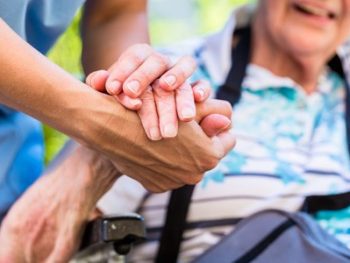Pemi-Baker Hospice & Home Health is helping celebrate this year’s Social Work Month in March with the theme “The Time is Right for Social Work” to highlight how social workers have enriched our society for more than a century and how their services continue to be needed today.
The annual Social Work Month campaign is a time to inform public, policymakers, and legislators about the services social workers provide in an array of sectors, including hospitals, mental health centers, schools, social service agencies, community centers and home health care.
People become social workers because they have a strong desire to help others and make our society a better place to live for all. Social work is one of the fastest growing professions in the United States, according to the Bureau of Labor Statistics (BLS). There are almost 720,000 professional social workers in our nation, but that number is expected to rise to more than 800,000 by 2030, BLS said.
Throughout U.S. History, social workers have:
- Fought for client privacy and mental health services
- Fought for civil and voting rights for people of color
- Achieved the minimum wage and safer workplaces for poor people
- Expanded reproductive and employment rights for American women
- Raised awareness about HIV/AIDS prevention and treatment
- Supported marriage and employment protections for LGBT people
- And much more!
Social workers touch millions of lives each day and it is likely a social worker at some time will assist you, a family member, or a friend. For example, are you a student who needs athletic shoes to participate in sports, but your parents can’t afford to buy them? Talk to your school social worker. They can help you find the resources you need. Do you want a better relationship with your spouse, partner, children, or parents? A social worker can help you forge stronger connections. Are you living with depression, anxiety, or a substance use disorder? A social worker can help you overcome them and thrive.
Pemi-Baker’s social workers continue to work on the frontlines throughout the pandemic, helping clients get the health care they need and helping loved ones overcome grief and loss. We would like to say a huge thank you to our social workers, Lauren Bell, BSW and Shannon Cassidy, BSW who work tirelessly day in and day out to help our clients and client’s families connect with the services they need. During Social Work Month we urge you to learn more about their amazing profession, thank the social workers in your lives, and help support the profession.
Currently, Pemi-Baker Hospice & Home Health is hiring for a part time home health and hospice social worker position. Call for details or visit our page on Indeed.
With over 55 years of experience, serving clients from 29 towns in central and northern New Hampshire, Pemi-Baker Hospice & Home Health is committed to creating healthier communities. Services include at-home healthcare (VNA), hospice and palliative care, and Community Programs including: American Red Cross CPR/AED/FA, Caregiver Support Groups and Grief and Bereavement Support Groups. Providing compassionate care with experienced staff who are trained, certified professionals in the business because of their hearts. In your time of need, we’re right where you need us.
Pemi-Baker is located at 101 Boulder Point Drive, Suite 3, Plymouth, NH. To contact us please call: 603-536-2232 or email: info@pbhha.org Like our Facebook Page: @pemibakerhospicehomehealth
~written by Anna Swanson


 Caregivers provide help with daily essentials along with the physical and emotional support needed by our loved ones late in life. But do we ever stop to take care of the caregiver? How often do we say “thank you” for being there for our loved ones, our clients, and the most defenseless in society? When do we take the time to ask how the caregiver is doing? Care-giving can be a gratifying experience but can also cause a great deal of stress. While caring for and focusing on another, a caregiver can neglect their own health, causing harm over time. Therefore, it is essential to provide tools and resources to help manage stress. If a caregiver doesn’t care for themselves, they can’t care for someone else.
Caregivers provide help with daily essentials along with the physical and emotional support needed by our loved ones late in life. But do we ever stop to take care of the caregiver? How often do we say “thank you” for being there for our loved ones, our clients, and the most defenseless in society? When do we take the time to ask how the caregiver is doing? Care-giving can be a gratifying experience but can also cause a great deal of stress. While caring for and focusing on another, a caregiver can neglect their own health, causing harm over time. Therefore, it is essential to provide tools and resources to help manage stress. If a caregiver doesn’t care for themselves, they can’t care for someone else. Make sure you take time on February 18th to honor the people who care for our most vulnerable population. For example, you could give cards with encouraging words of appreciation or a small gift to show gratitude. You can also honor caregivers on social media using the hashtag #nationalcaregiversday and let people know what makes them special. Here are some suggestions for a small gift to the caregivers in your life:
Make sure you take time on February 18th to honor the people who care for our most vulnerable population. For example, you could give cards with encouraging words of appreciation or a small gift to show gratitude. You can also honor caregivers on social media using the hashtag #nationalcaregiversday and let people know what makes them special. Here are some suggestions for a small gift to the caregivers in your life: The
The 
 Adults, young adults, and in some cases mature teens from all backgrounds, experiences, and cultures. Effective hospice volunteers embrace the fact that their role is one of compassionate service.
Adults, young adults, and in some cases mature teens from all backgrounds, experiences, and cultures. Effective hospice volunteers embrace the fact that their role is one of compassionate service. Contact Shannon Cassidy, Pemi-Baker Hospice & Home Health’s Hospice Volunteer Coordinator at 603-536-2232 or email her at
Contact Shannon Cassidy, Pemi-Baker Hospice & Home Health’s Hospice Volunteer Coordinator at 603-536-2232 or email her at 


 Another benefit that at-home therapy provides, is the opportunity to assess the safety and accessibility of the home environment. A therapist’s trained eyes can spot fall hazards or bathroom dangers and provide helpful preventive advice.
Another benefit that at-home therapy provides, is the opportunity to assess the safety and accessibility of the home environment. A therapist’s trained eyes can spot fall hazards or bathroom dangers and provide helpful preventive advice. The existence of hospice makes this level of freedom available to many who otherwise would not have had it. Hospice care offers 24/7 clinical support, medication and pain management, assistance with daily living activities, medical supplies and equipment, volunteer support and companionship, social, spiritual and grief support from social workers and chaplains, for the whole family.
The existence of hospice makes this level of freedom available to many who otherwise would not have had it. Hospice care offers 24/7 clinical support, medication and pain management, assistance with daily living activities, medical supplies and equipment, volunteer support and companionship, social, spiritual and grief support from social workers and chaplains, for the whole family. The elderly who wish to retain the freedom of staying in their home and ending their lives on their own terms experience true psychological benefits. Their comfortable surroundings allow them to end their lives with a sense of dignity, which is incredibly valuable. In fact, home care harkens back to older days, when tending to the terminally ill at home was the standard. There’s always the added benefit of being closer to their loved ones in their final days.
The elderly who wish to retain the freedom of staying in their home and ending their lives on their own terms experience true psychological benefits. Their comfortable surroundings allow them to end their lives with a sense of dignity, which is incredibly valuable. In fact, home care harkens back to older days, when tending to the terminally ill at home was the standard. There’s always the added benefit of being closer to their loved ones in their final days.




















